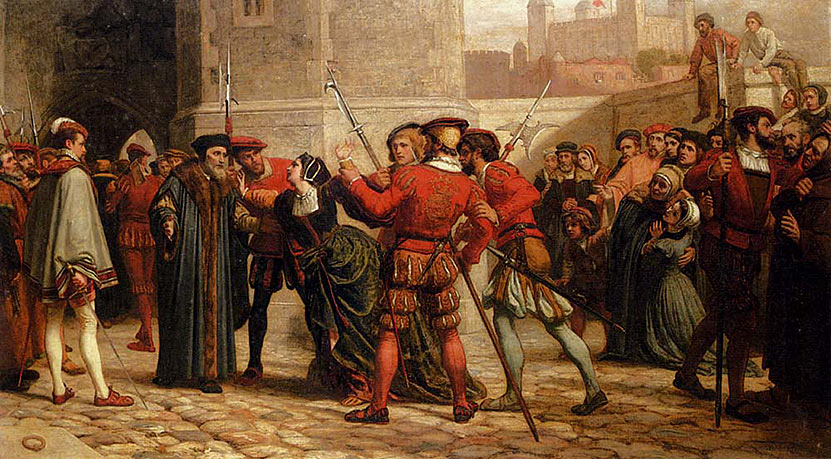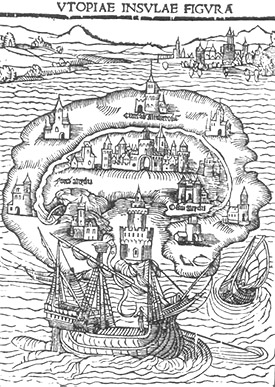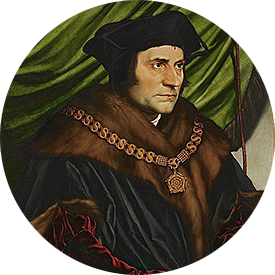Think
THOMAS MORO AND THE UTOPIA OF SUSTAINABLE DEVELOPMENT
Julia Urabayen addresses the Renaissance concern for equality and welfare in the writings of Thomas More.
and welfare in the writings of Thomas More. The great humanist
invented Utopia as a real life project . And what for us
has come to be seen as unattainable, now finds a new form in the Sustainable Development Goals.
development form in the Sustainable Development Goals (SDGs).

William Yeames, "The meeting of sir Thomas More with his daughter after his sentence of death", 1872.
development Both the general philosophy underpinning the Sustainable Development Goals (SDGs) proposed by the United Nations at diary 2030 and many of the specific challenges specified in each of the SDGs are directly related to the modern political project initiated during the Renaissance of the 15th and 16th centuries. Although it is possible to find partial precedents in the works of some Italian humanists, such as Leon Battista Alberti (1404-1472) or Giovanni Pico della Mirándola (1463-1494), it is undoubtedly Utopia de Thomas More is the work which, in 1516, marked the starting signal for the new way - it should not be forgotten that modernus derives from modo - of conceiving socio-political phenomena and governmental theories.
|
|
Considering only his work Utopia, it is possible to see how he raises the most salient issues of the SDGs. Centuries before the theoretical and factual development of European nation-states, More's Utopia proposes the need to unify the plurality of laws, statutes and jurisdictions of the medieval city under the principle of equality of all citizens before one and the same law. This is a reform and re-construction of institutions (SDG 16) specifically oriented towards the reduction of social inequalities and Materials (SDG 10) of citizens, which will establish as a sine qua non condition for the success of modern political project the need to guarantee the material wealth of citizens through a harmonious and "sustainable" mobilisation of all available productive forces, both technical and human, Materials and immaterial.
This mobilisation takes place on three main fronts. The first of these concerns the design of an adequate infrastructure that guarantees and promotes the free mobility of people, services and goods not only between the 54 cities that make up the island and the political community of Utopia, but also within each of these cities. Moro sets out in detail the urbanistic design of the cities and the architectural typology of the buildings with the aim of goal facilitating the circulation of means of transport; this constitutes the first sustainable mobility plan of modernity. Concretely, and in contrast to the variegated and narrow streets typical of medieval cities, the streets of all the cities of Utopia are planned with a minimum width of 20 feet (approximately 6 metres) so that two carriages travelling in opposite directions can cross each other, which is what will avoid the continuous agglomerations that occurred in medieval cities. Likewise, both the typology and the Materials of each house (which had to be built with stone instead of wood and adobe) are designed to guarantee their sustainability over time and reduce their vulnerability to the catastrophes of the period, such as fires and external attacks. Innovation and infrastructure goal (SDG 9) are used with the aim of creating materially sustainable cities (SDG 11), which in turn is the precondition for the possibility of a viable reform of political institutions and social customs.
 Once the necessary development of the resources Materials has been achieved, the second front that Moro addresses focuses on the reorganisation of production labour relations (SDG 8), the form of consumption (SDG 12) and the education needed to achieve this (SDG 4). With regard to the first point, it is well known that Utopia The Constitution made work compulsory for all citizens and limited workshop work to 6 hours a day. This organisation of labour forces also included the incorporation of women into labour relations and their training in the same trades in which men were trained. In the same way, each city is autonomous and satisfies its own needs by planning production on a local scale based on circular economies of production-consumption where each family can have everything it needs by going to the city's public stores, because in Utopia there is neither money nor private property.
Once the necessary development of the resources Materials has been achieved, the second front that Moro addresses focuses on the reorganisation of production labour relations (SDG 8), the form of consumption (SDG 12) and the education needed to achieve this (SDG 4). With regard to the first point, it is well known that Utopia The Constitution made work compulsory for all citizens and limited workshop work to 6 hours a day. This organisation of labour forces also included the incorporation of women into labour relations and their training in the same trades in which men were trained. In the same way, each city is autonomous and satisfies its own needs by planning production on a local scale based on circular economies of production-consumption where each family can have everything it needs by going to the city's public stores, because in Utopia there is neither money nor private property.
For its part, the education of children is a public and compulsory activity from which no one is excluded Exempt. Everyone is instructed in the main arts and crafts useful for the satisfaction of needs Materials. The knowledge of Humanities and political science is reserved for the small number of people interested in becoming civil servants or "traniboros", who are the ones who will devote themselves to the planning and recording of productive activities. In other words, in Utopia there is a re-valorisation of the arts and techniques, which had been habitually scorned as "servile arts" during the Age average. This re-valorisation is one of the most relevant points of the modern project , which has reached the present day under the modality of Industry 4.0 and the predominance of scientific-technical disciplines in our world today. If the previous front was concerned with the construction of a habitable environment, this one is concerned with production, both of the goods destined to satisfy needs and of the workers who produce them, for which Utopia will have a whole series of public services typical of the welfare state, such as schools, hospitals, markets, private housing (but publicly owned) and public canteens.
Finally, it addresses those areas whose successful development can only be achieved if both the material infrastructure and the socio-economic structure of society have been properly organised. Moro focuses on the issues, fundamental to any society, that must be made possible by the development and sustainability of the two previous dimensions: ethics and religion. Specifically, Moro proposes an ethics that identifies virtue with the joy and enjoyment of a natural world conceived as good, and a public and rational religion tolerant of any subject belief and based on the concept of "human dignity". A human dignity that the modern political project that underlies the SDGs asserts can only be fully guaranteed by a sustainable development of all the infrastructural, social and economic dimensions that each of the SDGs seeks to enhance.

Ambrosius Prosy Holbein, illustration of Utopia, 1518
(1) First, he opposed the divorce of King Henry VII from Queen Catherine of Aragon. When the Anglican Church emerged, he did not accept the certificate of Supremacy, which declared the king to be the head of this new Church. For these reasons, the thinker was sentenced to life imprisonment, accused of high treason for not taking the anti-papist oath. A few days later, at his trial, he was found guilty of death and put on trial by order of the king.
Thomas More Utopia. BUY.
Luciano Dialogues, English translation. BUY.

 Before explaining the way in which Utopia In connection with the SDGs, it is worth briefly introducing the Saint. Thomas More (1478-1535) was Lord Chancellor of England. Prior to that position he had been sheriff This enabled him, for example, to carry out some health reforms (Utopians consider medical knowledge to be very useful and valuable). He studied at Oxford University and then law at the University of New Inn. From 1501 to 1503 he was imprisoned in the Charterhouse in London, where he perfected his Latin and especially his Greek. There he acquired the Christian humanist ideal and his admiration for monastic life. Finally, he chose to live his Christian ideal in the world. He met personally
Before explaining the way in which Utopia In connection with the SDGs, it is worth briefly introducing the Saint. Thomas More (1478-1535) was Lord Chancellor of England. Prior to that position he had been sheriff This enabled him, for example, to carry out some health reforms (Utopians consider medical knowledge to be very useful and valuable). He studied at Oxford University and then law at the University of New Inn. From 1501 to 1503 he was imprisoned in the Charterhouse in London, where he perfected his Latin and especially his Greek. There he acquired the Christian humanist ideal and his admiration for monastic life. Finally, he chose to live his Christian ideal in the world. He met personally 




